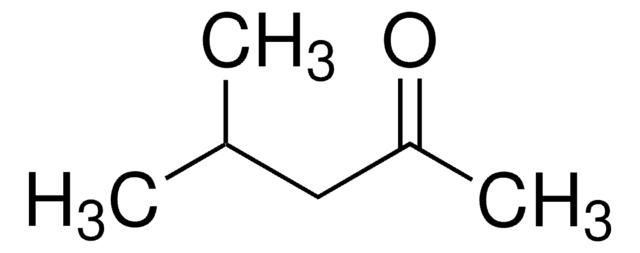46211
2-Pentanone
analytical standard
Synonym(s):
Methyl propyl ketone
About This Item
Recommended Products
grade
analytical standard
Quality Level
vapor pressure
27 mmHg ( 20 °C)
assay
98-100% (GC)
autoignition temp.
941 °F
shelf life
limited shelf life, expiry date on the label
expl. lim.
8.2 %
technique(s)
HPLC: suitable
gas chromatography (GC): suitable
refractive index
n20/D 1.39 (lit.)
bp
101-105 °C (lit.)
mp
−78 °C (lit.)
solubility
H2O: soluble 72.6 g/L at 20 °C (OECD Test Guideline 105)
density
0.809 g/mL at 25 °C (lit.)
application(s)
cleaning products
cosmetics
environmental
flavors and fragrances
food and beverages
personal care
format
neat
storage temp.
2-30°C
SMILES string
CCCC(C)=O
InChI
1S/C5H10O/c1-3-4-5(2)6/h3-4H2,1-2H3
InChI key
XNLICIUVMPYHGG-UHFFFAOYSA-N
Looking for similar products? Visit Product Comparison Guide
Application
Recommended products
signalword
Danger
hcodes
Hazard Classifications
Acute Tox. 4 Oral - Eye Irrit. 2 - Flam. Liq. 2
Storage Class
3 - Flammable liquids
wgk_germany
WGK 1
flash_point_f
46.4 °F - closed cup
flash_point_c
8 °C - closed cup
ppe
Eyeshields, Faceshields, Gloves, type ABEK (EN14387) respirator filter
Choose from one of the most recent versions:
Certificates of Analysis (COA)
Don't see the Right Version?
If you require a particular version, you can look up a specific certificate by the Lot or Batch number.
Already Own This Product?
Find documentation for the products that you have recently purchased in the Document Library.
Customers Also Viewed
Our team of scientists has experience in all areas of research including Life Science, Material Science, Chemical Synthesis, Chromatography, Analytical and many others.
Contact Technical Service





![Benzo[a]pyrene ≥96% (HPLC)](/deepweb/assets/sigmaaldrich/product/structures/253/820/be96d879-1811-46c0-8f11-612019691c2d/640/be96d879-1811-46c0-8f11-612019691c2d.png)




